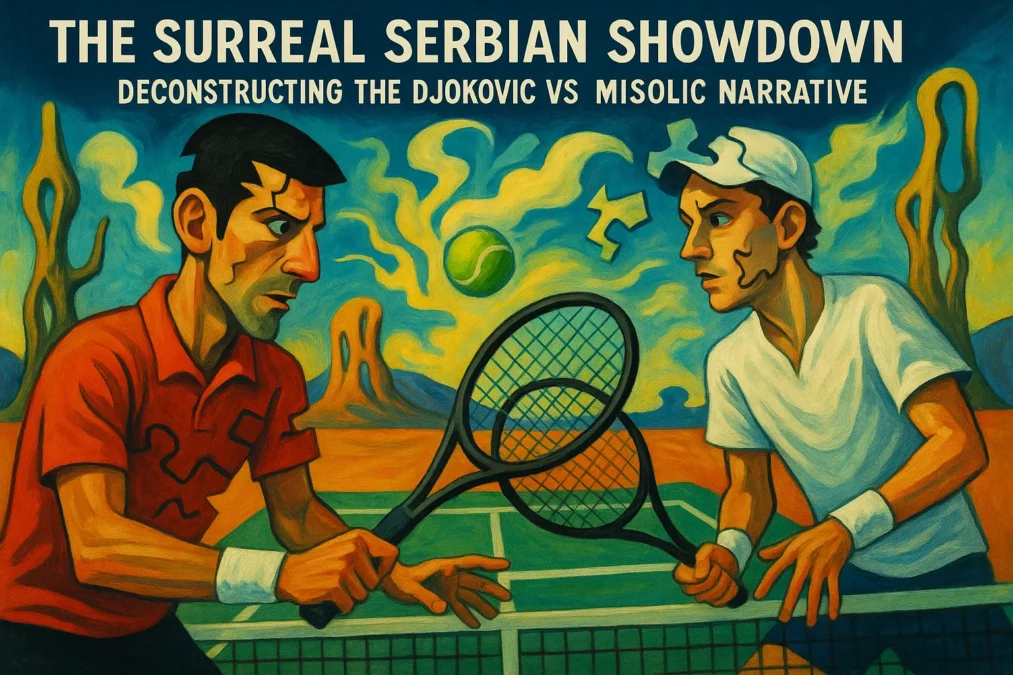Djokovic vs Misolic: In the sprawling, often predictable theater of modern tennis, certain matches are penciled into the calendar years in advance. We mark our calendars for the epic, multi-hour Grand Slam finals, the storied rivalries that define eras, and the clashes between the established titans of the tour. And then, there are the matches that appear almost as a mirage—brief, unexpected, and profoundly illuminating. The encounter between Novak Djokovic and Filip Misolic in the second round of the 2022 Belgrade Open belongs firmly in the latter category. On paper, it was a simple, almost routine affair: the world number one, the greatest player of all time, facing a 20-year-old Austrian qualifier ranked outside the top 250. But to view it through that simplistic lens is to miss the entire point. The Djokovic vs Misolic match was never just about a scoreline. It was a poignant snapshot of a sport in constant flux, a moment where past, present, and future collided on a single court in Serbia. It was a tale of a king and a potential heir, a mentor and a student, and a rare glimpse into the human side of a competitor often perceived as an impenetrable machine. This is the story of that match, the context that made it so special, and the ripples it sent through the tennis world.
The Stage is Set: Belgrade as a Backdrop
Belgrade is more than just a city on the map for Novak Djokovic; it is his home, his heart, and the foundation of his indomitable spirit. The Novak Tennis Center, which hosts the Belgrade Open, is his kingdom, a facility built from his vision and success. Playing at home brings a unique kind of pressure for Djokovic—the weight of immense national expectation mixed with the comfort of familiar faces and roaring support. In 2022, this dynamic was particularly potent. He arrived in Belgrade not just as the favorite, but as a figure seeking rhythm and matches after a turbulent start to the year defined by his absence from tournaments due to his vaccination status. The Australian Open saga was fresh in everyone’s mind, and each match he played was scrutinized not just for the win or loss, but for what it signaled about his form and mindset.
Enter Filip Misolic. To the casual tennis fan, his name was unknown. A young Austrian with a Croatian heritage, he was grinding his way through the lower tiers of professional tennis, the Challenger Tour and qualifying rounds where dreams are either forged or broken. He had earned his place in the Belgrade main draw not through a wild card or a high ranking, but the old-fashioned way: by winning three qualifying matches. His was the classic underdog story, a narrative tennis loves. But for those paying close attention, there was a deeper, more intriguing connection. Misolic, despite representing Austria, had spent a significant portion of his formative development years training at the very same Novak Tennis Center where this match would take place. He was, in a very real sense, a product of Djokovic’s ecosystem.
This shared history transformed a simple second-round match into something far more compelling. It was no longer just the Goliath versus David narrative. It was the master of the house versus a young man who had once trained within its walls. The familiar practice courts, the unique atmosphere, the specific bounce of the clay—these were factors both players understood intimately. This shared context added a layer of psychological complexity that is rare in such an apparent mismatch. For Misolic, it was the ultimate test and the ultimate opportunity. For Djokovic, it was a match he was expected to win, but one he would approach with a unique sense of responsibility, knowing all eyes, especially those of a hopeful nation, were upon him.
Who is Filip Misolic? The Prodigy from the Djokovic Academy
Before the first ball was struck in anger, the question on everyone’s lips was: who exactly is Filip Misolic? His biography reads like that of many modern European talents, a story of cross-border development and relentless pursuit. Born in Graz, Austria, to a family with Croatian roots, Misolic displayed a prodigious talent for tennis from a very young age. His journey to the professional tour led him to a crucial destination: Serbia. Seeking world-class training and competition, he became part of the program at the Novak Tennis Center, an academy founded by Djokovic with the explicit goal of nurturing the next generation of tennis champions.
Training at the Djokovic Academy is more than just access to good courts and coaches. It is an immersion into the “Nole” philosophy—a culture built on discipline, resilience, and a deep understanding of the sport’s physical and mental demands. While there, Misolic would have been steeped in the methods that propelled Djokovic to the summit. He would have trained on the same clay courts, worked with coaches familiar with the Djokovic system, and absorbed, even indirectly, the ethos of his idol. This background is crucial to understanding his performance. He was not an outsider coming in cold; he was a graduate returning to his alma mater to face the dean.
In the lead-up to the Djokovic vs Misolic match, the young Austrian was on a tear. He had successfully navigated the qualifying rounds, defeating more experienced players to earn his spot in the main draw. His first-round victory over Roman Safiullin was a statement win, proving he belonged at the ATP level. He carried a powerful, aggressive game built around a heavy forehand and a fearlessness that is the trademark of youth. He had nothing to lose and everything to gain. The confidence from his qualifying run, combined with his intimate knowledge of the conditions, made him a far more dangerous opponent than his ranking suggested. He was the embodiment of a live underdog, a storm gathering momentum right in Djokovic’s backyard.
Breaking Down the Djokovic vs Misolic Match Itself
When the two players walked onto the court, the atmosphere was electric, a mix of partisan celebration and curious anticipation. The first set unfolded not as a coronation, but as a genuine contest. Misolic, displaying the nerves of steel one would expect from a young man in his position, did not crumble under the spotlight. Instead, he embraced it. He matched Djokovic from the baseline in extended rallies, unleashing his powerful groundstrokes and refusing to be bullied. The set was tight, competitive, and served notice that this would be no walk in the park for the world number one. Djokovic, as he so often does, raised his level at the critical moment, navigating the pressure to secure the first set.
The second set, however, is where the narrative of the Djokovic vs Misolic encounter truly took shape. The young Austrian’s resistance began to waver, as the physical and mental toll of facing a legend of the sport started to show. The unforced errors that had been kept at bay began to creep in, while Djokovic, the ultimate predator, sensed the opening and pounced. His return of serve, arguably the greatest weapon in the history of the sport, became a relentless source of pressure. His movement, so fluid and efficient, extinguished any hope Misolic had of winning points with sheer power. Djokovic accelerated, breaking Misolic’s serve and running away with the set, demonstrating the chasm that exists between being very good and being truly great.
The final scoreline of 6-2, 6-2 in the second round of the 2022 Belgrade Open tells a story of dominance, but it is an incomplete one. The first half of the match was far more competitive than the score suggests. What the numbers don’t capture is the feeling in the stadium—the encouragement from the crowd for their hero, but also the respectful applause for the young challenger who dared to dream big. For a set, Filip Misolic went toe-to-toe with Novak Djokovic, and in doing so, he earned something more valuable than ranking points: he earned respect and invaluable experience that would fuel his career for years to come.
The Mentor and the Challenger: A Unique Dynamic
What truly set the Djokovic vs Misolic match apart from other first-round encounters was the palpable sense of mentorship that permeated the event. This was not the icy stare-down of two bitter rivals; it was a meeting between a legend and a student who had been influenced by his path. Throughout the match, Djokovic’s demeanor was notably supportive. There were moments of encouragement, a shared smile after a particularly grueling point, and a general air of respect that transcended the competitive nature of the sport. Djokovic was not just playing an opponent; he was assessing a product of his own system, a representative of the future he is trying to build.
This dynamic was crystallized in the moments immediately following the match. The net handshake was warm and prolonged. But it was after the formalities, during Djokovic’s on-court interview, that the moment became iconic. Djokovic called a visibly emotional Misolic back onto the court. In front of the home crowd, he praised the young Austrian’s performance, his potential, and his fighting spirit. He then presented him with a gift—a brand new Novak-branded tennis bag, but more significantly, a box of his own signature shoes. It was a gesture rich with symbolism: the passing of a torch, an investment in the future, and a message that said, “You are one of us.”
This act of generosity transformed the Djokovic vs Misolic narrative entirely. The match was no longer just a result in the record books; it became a lesson, a memory, and a career-launching moment for Misolic. For Djokovic, it reinforced an aspect of his character that is sometimes overlooked in the heat of battle: his profound love for the game and his desire to nurture the next generation. He saw himself in Misolic—a young, ambitious player from a small nation with big dreams. In that gesture, he was paying forward the support he himself had received, solidifying his role not just as a champion, but as a steward of the sport.
The Aftermath: Trajectories Since Their Belgrade Meeting
The impact of the Djokovic vs Misolic match on their respective careers has been, as one would expect, vastly different, yet significant for both. For Novak Djokovic, the match was a stepping stone. He used the Belgrade Open as vital match practice, building rhythm and confidence that would ultimately contribute to his triumphant run at Wimbledon just a few months later, where he claimed his 21st Grand Slam title. The match against Misolic was a useful test, a chance to work on his game under competitive conditions, and it was quickly absorbed into the relentless march of his historic career. It was a footnote in his legendary saga, but a heartwarming one that showcased his role as an elder statesman.
For Filip Misolic, the encounter was a watershed moment. The confidence and exposure he gained from sharing the court with his idol had an immediate and tangible effect. Just a few months after the Djokovic vs Misolic match, he embarked on a spectacular run at the ATP Challenger event in Salzburg. There, he won the title, the biggest of his young career, which catapulted his ranking up over 100 spots and into the top 200 for the first time. The belief that he could compete with the best was no longer a theory; he had lived it. The match became the reference point for his potential, the story he could tell himself when facing other tough opponents.
In the years since, Misolic has continued his grind on the ATP Tour, working to establish himself as a consistent presence. The shadow of the Djokovic vs Misolic match looms large in his biography, and he has spoken in interviews about how the experience and Djokovic’s words of encouragement fundamentally changed his perspective. It gave him a blueprint for professionalism and a goal to strive toward. While Djokovic continued to add to his legacy, Misolic was building his from the ground up, using that surreal day in Belgrade as his foundation. The match was a launchpad, proving that even in defeat, a young player can secure a victory for his future.
The Bigger Picture: What Djokovic vs Misolic Tells Us About Tennis
The story of Djokovic vs Misolic is a microcosm of the eternal cycle of professional sports. It is a vivid illustration of the passing of the torch, a theme that is as old as competition itself. Every great champion was once an unknown challenger, and every unknown challenger dreams of becoming a champion. This match placed that cycle in sharp relief, happening not in the distant past, but in real-time for us to witness. It reminded fans that the giants of the game were not born on pedestals; they too had to climb, and they too looked up to idols before eventually surpassing them.
Furthermore, the match highlighted the immense importance of tennis academies and developmental ecosystems like the one Djokovic has created. The Novak Tennis Center is more than a branding exercise; it is a functional, productive hub for talent. The fact that a player like Misolic could train there and then later compete against its founder is a powerful testament to the academy’s success and mission. It shows that Djokovic’s influence on tennis will extend far beyond his own trophy count, potentially shaping the careers of multiple future champions who pass through his doors.
Finally, the Djokovic vs Misolic encounter serves as a perfect reminder of why we watch sports beyond the finals and the glory. We watch for the human stories. We watch for the unexpected connections, the moments of sportsmanship, and the raw emotion of a dream realized, even if only for a set. In a world often dominated by statistics and cold analysis, this match was a warm, narrative-driven affair that resonated on a deeply human level. It was a story about inspiration, respect, and the beautiful, unbreakable thread that connects generations of athletes.
Lagree vs Pilates: The Ultimate Guide to Choosing Your Low-Impact Fitness Path
A Tale of Two Players: A Statistical and Stylistic Comparison
To fully appreciate the context of the Djokovic vs Misolic matchup, it is helpful to look at a direct comparison of the two players at that specific moment in time. The gulf in experience and achievement is astronomical, which is what made the competitive nature of the first set so remarkable.
| Aspect | Novak Djokovic (at time of match) | Filip Misolic (at time of match) |
|---|---|---|
| Age & Experience | 34 years old; over 15 years on tour | 20 years old; ATP Tour newcomer |
| ATP Ranking | World No. 1 | World No. 250+ (Qualifier) |
| Career Titles | 86 ATP Titles, 20 Grand Slams | 0 ATP Titles, 0 Grand Slam Main Draw Wins |
| Playing Style | Ultimate defender; best return of serve ever; flawless technique; mental fortitude. | Aggressive baseliner; powerful forehand; seeks to dictate play; typical “young gun” style. |
| Career Stage | Legend consolidating his GOAT status | Prospect seeking a foothold on the tour |
| Court Surface | Elite on all surfaces, including clay | Most comfortable on clay, his development surface |
This table starkly illustrates the nature of the challenge. Djokovic was at the pinnacle of the sport, a completed masterpiece. Misolic was a rough sketch, a canvas of potential. His style, based on power and aggression, is a common one among young players trying to make a name for themselves. Djokovic’s style, by contrast, is a refined system built over decades to expose and dismantle exactly that kind of power-based game. The match was a perfect case study in experience versus exuberance, and for a brief period, it was a compelling battle.
In Their Own Words: Quotes from the Players
The significance of the Djokovic vs Misolic match was not lost on the participants. Their comments before and after the encounter provide a fascinating insight into their mindsets and solidify the unique nature of their meeting.
Novak Djokovic on Filip Misolic:
- Before the match: “I know him well, he trained in my academy. He is a hard worker, a very nice guy. His family is dedicated. It’s great to see him doing well. It’s a special moment for both of us, and for the academy as well.”
- After the match (on court): “I would like to say a few words for Filip. He is a young player who has a great future ahead of him. He has a great team and family around him. I remember when I was his age and starting out… I know how much this means to him and his family. I wish him all the best. I told him he deserves every success.” This was followed by his gift of the equipment.
Filip Misolic on facing Novak Djokovic:
- Before the match: “It’s a dream come true. He is my idol. To play against him in Belgrade, where I used to train, is unbelievable. I will try to enjoy every moment and give my best.”
- After the match: “It was an incredible experience for me. I was nervous at the beginning, but Novak was very supportive. What he did for me after the match, the gift and his words… I will never forget this. This is the biggest motivation for me to work even harder.”
These quotes perfectly capture the essence of the Djokovic vs Misolic story. Djokovic’s words are those of a mentor—proud, supportive, and reflective. Misolic’s are those of a dreamy-eyed admirer, humbled and inspired by the experience. The mutual respect is undeniable and forms the emotional core of this unique sporting moment.
Conclusion: More Than a Match, A Moment
The Djokovic vs Misolic match in Belgrade in 2022 will not be remembered as an epic five-set thriller or a monumental upset. In the cold, hard ledger of tennis history, it is a straightforward win for the favorite. But to dismiss it as such would be to ignore its profound soul. This was a match that transcended sport. It was a narrative-rich event that encapsulated the dreams of every young athlete, the responsibility of every great champion, and the beautiful, cyclical nature of competition. It was a showcase of Djokovic’s humanity and a launching pad for Misolic’s ambition. The Djokovic vs Misolic story is a reminder that in tennis, as in life, the most meaningful victories are not always the ones reflected on the scoreboard. Sometimes, they are the lessons learned, the respect earned, and the inspiration passed from one generation to the next, ensuring the beautiful game continues to thrive long after the final point has been played.
Frequently Asked Questions (FAQ)
What was the final score of the Djokovic vs Misolic match?
The final score of their 2022 Belgrade Open second-round match was 6-2, 6-2 in favor of Novak Djokovic. While the score suggests a straightforward win, the first set was notably more competitive, with Misolic holding his own for significant periods before Djokovic’s superior experience and skill ultimately decided the contest.
Why was the Djokovic vs Misolic match so significant?
The significance of the Djokovic vs Misolic match extends far beyond the result. It was significant because Misolic had previously trained at the Novak Djokovic Tennis Academy, creating a unique mentor-prodigy dynamic. Djokovic’s post-match gesture of calling Misolic back onto the court to praise him and gift him equipment turned a simple match into a symbolic passing of the torch and a heartwarming moment of sportsmanship.
Has Filip Misolic improved his ranking since playing Djokovic?
Yes, absolutely. The confidence Filip Misolic gained from the Djokovic vs Misolic match was a major catalyst for his career. Just a couple of months later, he won an ATP Challenger tour event in Salzburg, which rocketed his ranking from outside the top 250 into the top 200. He has since continued to work on establishing himself as a regular on the ATP Tour.
Did Novak Djokovic know Misolic before they played?
Yes, Novak Djokovic was aware of Filip Misolic before their match. Djokovic explicitly stated that he knew Misolic from his time training at the Novak Tennis Center in Belgrade. This pre-existing familiarity added a unique layer to their encounter, distinguishing it from a typical match between a top player and a qualifier.
What did Djokovic give to Misolic after their match?
Following his on-court interview, Novak Djokovic presented Filip Misolic with a generous gift: a new Novak-branded tennis bag and a box containing several pairs of his own signature Lacoste tennis shoes. This gesture was widely praised as a classy and supportive move from the champion towards the emerging player.



